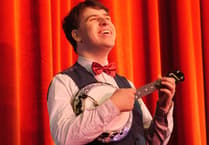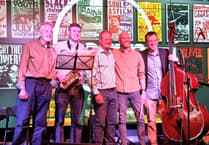A typically varied Haslemere Musical Society programme at Haslemere Hall on March 2 comprised some more unusual material amid a wealth of instantly recognisable, whistle-along classics, providing an evening of entertainment filled with joy, pathos, excitement and reflection.
Conducted by James Ross, the orchestra’s declamatory opening salvo set the tone with the prelude to Act III of Wagner’s Lohengrin – a rollicking rollercoaster of a ride that showed off the players’ ability to shift effortlessly from raucous to touchingly sensitive at the flick of a baton. The singers, immaculate in black with daffodils on their lapels, joined in for the Bridal Chorus and more than a few of the audience could be spotted humming along.
Ernest Chausson’s Poème de l’amour et de la Mer formed the majority of the first half, with soprano Janice Watson demonstrating the power, deftness of touch and range of vocal colour that has brought her such international acclaim.
Rarely performed in the UK, Poème is a masterpiece of an orchestrated song cycle, with the orchestra providing so much more than mere accompaniment. While soaring, plaintive woodwind and string solos, particularly in the Interlude, demonstrated individual skill and musicianship, the warmth and sensitivity of the orchestra allowed Watson to move effortlessly through the texture, taking us to the interval glass of wine.
From start to finish, the second half was a joyous romp through some of the repertoire’s most famous opera choruses by Giuseppe Verdi and Pietro Mascagni, with the choir taking centre stage.
The Overture and Chorus of the Hebrew Slaves from Nabucco galvanised Tom Lydon’s well-drilled and enthusiastic singers, while the impressive array of improvised percussion in the Anvil Chorus from Il Travatore evoked a tangible sense of the gypsy tinkers celebrating their work, wine and women.
Rataplan della Gloria from La Forza del Destino delighted the audience, and the famous trumpet melody from Aida’s sumptuous Grand March and Ballet Music made it almost impossible not to tap a foot or two.
To finish, a contrasting pair from Mascagni’s one-act opera, Cavalleria Rusticana. The Intermezzo, with its haunting oboe lines and soaring string melodies, was the perfect palette cleanser before the evening’s triumphant finale of the Easter Hymn. The echoes of Watson’s glorious final top B sent the audience away into the frosty darkness with a spring in their step, a smile on their face and, undoubtedly, humming a tune or two.
William Unwin




